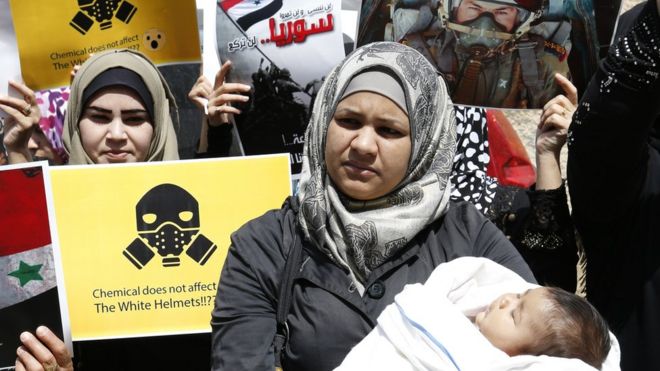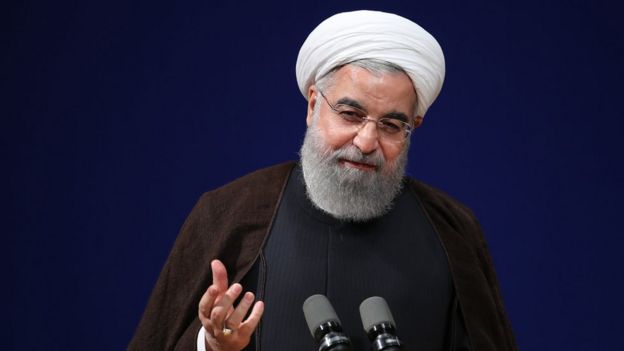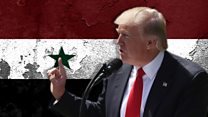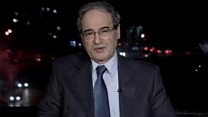 EPA
EPA
Iran's President Hassan Rouhani has said "terrorists are celebrating" US strikes on a Syrian airbase.
His comments echo the response from Russia, which like Iran is allied to Syria, and from Syria itself.
At least six people are reported to have been killed in the missile strikes in the early hours of Friday.
The strikes followed Wednesday's suspected chemical attack on the rebel-held town of Khan Sheikhoun, in which 89 people are reported to have died.
The Syrian military denied using any chemical agents, while its ally Russia said - without providing evidence - that an air strike hit a storage facility where rebels were keeping chemical weapons.
The UK's Foreign Secretary Boris Johnson called off a visit to Moscow, saying the situation had changed "fundamentally" and he would work with the US in pursuit of a ceasefire.
On Saturday in the Syrian capital Damascus and around the world, people protested against the air strikes, insisting there should be no US war against Syria.

What did Iran's president say?
In a speech broadcast on state television, Mr Rouhani said: "The man who is now in office in America claimed that he wanted to fight terrorism. But today, all the terrorists in Syria are celebrating this US attack.
"Why did you help terrorist groups and support them in your first move?"
Iran has used the term "terrorist groups" to refer to rebels, many backed by the US, who are fighting against Syria's President Bashar al-Assad.
But Mr Rouhani backed calls for an independent inquiry into the suspected chemical weapons attack.
 HANDOUT FROM IRANIAN GOVERNMENT
HANDOUT FROM IRANIAN GOVERNMENT
The US provides arms, training and military assistance to what it calls "moderate" Syrian rebel groups. It has led a coalition carrying out air strikes against jihadist groups in Syria since 2014 but this is the first time it has targeted government forces.

What happened in the US air strike?
- US Navy destroyers in the Mediterranean Sea fired 59 Tomahawk cruise missiles at Shayrat air base in western Homs province
- They targeted aircraft, aircraft shelters, storage areas, ammunition supply bunkers and air defence systems, the Pentagon said
- It happened at about 04:40 Syrian time (01:40 GMT) on Friday
- The Russian military was informed beforehand, a US military spokesman said
- The Pentagon said the base was used to store chemical weapons and that "every precaution" had been taken to avoid casualties.
- Syrian state media said as many as nine civilians had been killed in the strike, four of them children, but the BBC is unable to confirm this

On Saturday, Russia called on the US to provide evidence for its claim that there were chemical weapons at the site.
Defence ministry spokesman Maj Gen Igor Konashenkov said: "None of those at the airfield wear gas masks and they all feel perfectly normal.
"The question thus arises: who once again slipped something in to yet another US president as 'evidence' of the existence of 'chemical weapons' in a country Washington objects to, and what exactly was it?
"The only way to obtain any objective evidence of the alleged presence of poisonous substances at Shayrat and present it to the entire world community is to send a mission of professional experts there."

Who was behind the suspected chemical attack?
The US, the UK and the Western military alliance Nato have said Khan Sheikhoun was the victim of a chemical attack by Syrian forces; the Syrian government denies this, while Russia says the gas came from a rebel stockpile that was hit in a Syrian airstrike.
British and French representatives to the UN have dismissed Russia's claim.
The UK envoy said there was no evidence that non-state actors in Syria had access to chemical weapons producing the symptoms seen on Tuesday, while France's envoy said there was no fire after the air strike, even though a strike on an ammunition depot "would have caused a fire".

What have other Syria allies said?

Like Iran, Russia accused the US of encouraging "terrorists" with its air strike.
Russia's deputy ambassador to the UN, Vladimir Safronkov, was quoted as saying: "It's not difficult to imagine how much the spirits of these terrorists been raised."
US Secretary of State Rex Tillerson said Russia's response indicated "continued support for a regime that carries out these type of horrendous attacks on their own people".
North Korea, meanwhile, called Friday's strike "an unforgivable act of aggression" which showed its own decision to develop nuclear weapons was "the right choice a million times over".
- Syria 'chemical attack': What we know
- Syria 'chemical attack': What can forensics tell us?
- Syria 'chemical attack': What now?
- Why is there a war in Syria?
- The spectre of nerve agents in Syria - again
- Assad is secure, but Syria's war shows no sign of ending
- Six decisive points that changed Syria's war
- Returning home to ruins of East Aleppo
- Aleppo: Before and after images
- Syria peace talks: Armed groups come in from the cold
- Turkish policy sets new path for Syria
- Obama's Syria legacy
- After Aleppo, what next for Syria?
- Islamic State and the crisis in Iraq and Syria in maps
- What's left of Syria after five years of war?
- Syria's war: Special report

No comments:
Post a Comment